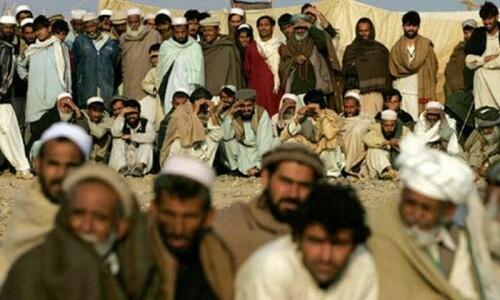Finance Minister Muhammad Aurangzeb has stated that Pakistan is on track to secure a new loan from the International Monetary Fund (IMF), adding that the money lender had been “very receptive in terms of agreeing to consider a larger, longer programme”.
He made the remarks in an interview with The National published on Monday.
The finance minister and his team were in Washington last week to attend the spring meetings of the IMF and the World Bank. They also conducted a series of bilateral meetings with visiting finance ministers, heads of financial institutions, and senior US officials.
In a meeting with the IMF chief and some members of its board of governors, Aurangzeb had reaffirmed Pakistan’s resolve to carry out “aggressive reforms” to stabilise its economy.
Last week, the finance minister said Pakistan had initiated discussions with the Fund over a new multi-billion dollar loan agreement to support its economic reform programme, adding that the country would at least be requesting for a three-year programme.
At the conclusion of his Washington visit, the minister said that an IMF team was anticipated to visit Pakistan by mid-May to negotiate a new long-term process, aiming to secure a staff-level agreement by mid-July. However, he went on to say he would not speculate the size or the duration of the programme yet.
In the interview published today, Aurangzeb said that macroeconomic indicators were shifting in Pakistan’s favour. “He also sounded optimistic that Pakistan’s currency has finally stabilised and said rampant inflation is on track to drop to single-digit levels by the end of next year,” The National said.
In a video shared by the publication on social media platform X, Aurangzeb said: “We have entered, as a country, this year in a much better shape compared to where we were this time last time around.
“We’ve had very constructive discussions with the Fund’s managing director and the senior team,” he said.
“And given that we are successfully completing this programme, the Fund has been very receptive in terms of agreeing to consider a larger and longer programme,” he added.
The National said that the government was reportedly seeking a $6 billion IMF loan but Aurangzeb said the figure was more of a “guesstimate”, with the loan’s final details to be determined when an IMF mission would visit Islamabad next month.
He said Pakistan would need at least three years of support to carry out a reform agenda across several sectors, including taxation and energy.
Talking about the spring meetings in Washington, he said that the situation in the Middle East was a frequent point of concern.
The report noted that the meetings took place the same week as Iran fired hundreds of missiles and drones at Israel in retaliation for a deadly strike that levelled its consular annex at its embassy in Syria.
Over the weekend, explosions were reported in Iran that were termed an Israeli strike but the limited scale of the so-called attack and the muted response from both Tehran and Tel Aviv indicated that there was no will on either side to further escalate the situation.
“Everyone is hoping it will remain contained,” Aurangzeb said.
Economy, remittances and CPEC
In the interview, Aurangzeb also underscored the importance of remittances to Pakistan’s economy. He said that payments from overseas were on the rise, and were expected to rise to about $29bn this fiscal year.
He said that the rupee was now stable and should only depreciate by between 6-8pc a year going forward.
The finance minister further said that inflation had gone down from a peak of about 38pc to about 21pc and should drop to below 10pc by the end of 2025.
He also talked about the country’s tech sector, saying it had grown from “literally nowhere” a few years ago to about $3.4bn today.
“There’s no reason why it can’t go to $4.5bn or $5bn in the next year,” he added. At the same time, he noted that large-scale manufacturing remained sluggish, pointing to energy costs and high interest rates.
Talking about China and the China-Pakistan Economic Corridor (CPEC), Aurangzeb said Pakistan had “missed a trick” by taking too long to monetise projects, including through boosting exports to special economic zones.
“We have been slow over the last few years,” he said. “We are going to move forward with phase two so that we can get going with the revenue generating part of the of CPEC,” he said.

















































